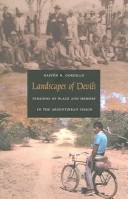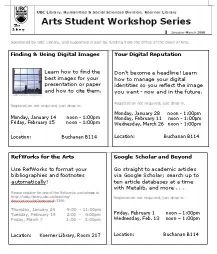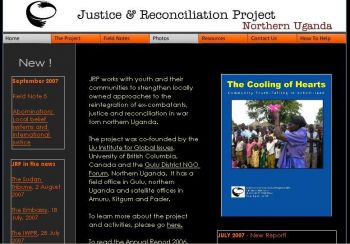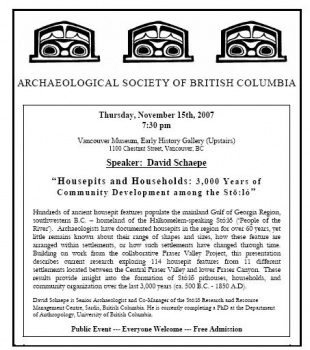January 22nd, 2008 by Susan Atkey | No Comments »

This Thursday, Dr. Gaston Gordillo, UBC Dept. of Anthropology, presents a talk entitled:
Places that Frighten: Residues of Wealth and Violence on the Argentinean Chaco Frontier
Location and Time
Thursday, January 24,
11:30 am – 1:00 pm
AnSo 205
Since 1987, Dr. Gordillo has based his research in the Gran Chaco region of northern Argentina. His current SSHRC-funded research project, “The Traces of History: Ruins and Memories of the Conquest of the Argentinean Chaco” involves a multi-sited ethnography on the old frontiers of the Gran Chaco. The project analyzes the legacy of the region’s long history of violence and resistance in contemporary landscapes and memories and examines the ways in which history is inscribed on, and erased from, space.
For a full list of Dr. Gordillo’s publications, see his profile page at the Dept of Anthropology. His books are available at Koerner Library, including:
To locate copies of journal articles by Dr. Gordillo, try the MetaLib search tool to search across multiple databases. Click this link to launch a predefined search for his name, or create your own search in the MetaLib Anthropology and Archaeology PowerSearch Page. After the list of results is returned from MetaLib, use the UBC eLink icon to locate a copy of the journal. Many of the articles are available electronically to UBC faculty, students, and staff.
Posted in Talks and Seminars | No Comments »
January 21st, 2008 by Susan Atkey | No Comments »
An upcoming talk in the UBC School of Library, Archival and Information Studies Colloquium Series may be of interest to Anthropologists:
The Archives of the Nisga’a Nation
The Nisga’a Lisims Government is concerned to establish proper care of its archival material. This talk will report on a consultation with the Nisga’a people about measures needed to provide good care of its archives. Professor Emeritus Terry Eastwood will explain the situation of Nisga’a Nation over the years and the character of its governance of its affairs and of the archives it has accumulated and preserved to date. It will then look at the prospects of building an archival program of the government.
Wednesday, January 23, 2008
12:15 p.m.-1:15 p.m.
Sherrington Room, Woodward Biomedical Library
Posted in Talks and Seminars | No Comments »
January 20th, 2008 by Susan Atkey | No Comments »

The new Faculty of Arts Outreach schedule for this term is out. This semester’s workshops are on the theme of intellectual property in a digital environment, and include workshops on Refworks, Google Scholar/Metalib, plus two new workshops: the first on finding and attributing digital images in papers and presentations, and the second on preserving your digital reputation.
For more information, you can download the flyer here, or click the “Continue reading…” link below for descriptions, dates, and locations.
Finding & Using Digital Images
Learn how to find the best images for your presentation or paper and how to cite them.
Monday, January 14, noon – 1:00pm
Friday, February 15, noon – 1:00pm
Your Digital Reputation
Don’t become a headline! Learn how to manage your digital identities so you reflect the image you want – now and in the future.
Monday, January 28 noon – 1:00pm
Monday, February 11 noon – 1:00pm
Wednesday, March 26 noon – 1:00pm
RefWorks for the Arts
Use RefWorks to format your bibliographies and footnotes automatically!
Thursday, January 24 9:00 – 11:00pm
Tuesday, February 19 2:00 – 4:00pm
Friday, March 7 1:00 – 3:00pm
Please register for one of the Refworks workshops at http://toby.library.ubc.ca/booking/
description.cfm?sessionid=5194
Location: Koerner Library, Room 217
Google Scholar and Beyond
Go straight to academic articles via Google Scholar; search up to ten article databases at a time with Metalib, and more . . .
Friday, February 1 noon – 1:00pm
Wednesday, Feb. 13 noon – 1:00pm
All sessions in Buchanan B114 , with the exception of RefWorks (Koerner 217).
Sponsored by UBC Library, and supported in part by funding from the Office of the Dean of Arts.
Posted in Talks and Seminars | No Comments »
January 9th, 2008 by Susan Atkey | No Comments »
This coming Friday, the Law & Society@UBC group presents a talk that will be of interest to Anthropologists:
Santa Clara Pueblo v. Martinez and Indigenous Women’s Rights: Can Gender and Sovereignty Co-Exist?
by Dr. Cheryl Suzack, Assistant Professor of English at the University of Victoria and a member of the Batchewana First Nations of Ojibways.
Abstract:
This paper explores the cultural and political implications for Indigenous women of the Martinez decision by taking up the following question: What are the implications for indigenous-feminist politics if the racial sovereignty asserted by tribal nations depends on socially-sanctioned sexual identities? It takes up this question by arguing for the value of a law and literature project that explores how Indigenous women writers such as Leslie Marmon Silko challenge conventional associations of gender identity.
Friday, January 11, 2008
4:30 pm to 5:30 pm
UBC Faculty of Law, Room 149
Posted in Talks and Seminars | No Comments »
November 27th, 2007 by Susan Atkey | No Comments »
A reminder of today’s Medical Anthropology Seminar:
“One size fits all? The experience of mothers and fathers in the Neonatal Intensive Care Unit”
Dr. Susan Albersheim, MD, FRCPC , Ph.D., Dept. of Pediatrics
27 November (Tuesday) 3:30-4:30
Anthropology and Sociology Building Rm 205
Dr. Albersheim’s Ph.D. dissertation, “Matters of life and death in the neonatal intensive care unit : decision-making for the not-yet-competent“is available online through the Proquest Theses and Dissertations database or in microform in Koerner Library.
(Note that you’ll have to be on campus or authenticated via VPN to access the online copy of the dissertation through the UBC Library licensed resource, Proquest Theses and Dissertations.)
Posted in Talks and Seminars | No Comments »
November 21st, 2007 by Susan Atkey | No Comments »

A reminder of tomorrow’s Anthropology roundtable discussion :
Ethnographic Methodologies for Justice and Reconciliation in Northern Uganda
1:00 – 2:00 pm Thursday, November 22 in AnSo 203
With the research group from the Liu Institute & Gulu, Uganda
Northern Uganda has experienced 20 years of conflict. 1.7 million people have been displaced into overcrowded and underserved camps. Each week, 1,000 people die of war related causes. The UN Under-secretary General, Jan Egeland recognized northern Uganda as one of the world’s worst, most neglected humanitarian crises. The primary victims of this conflict are civilians. Over 30,000 children as young as six years old have been abducted and forced to commit gross atrocities against thier own communities. If they manage to escape, they return to live in insecure camps. Many experience intense trauma and stigma by their neighbours. The Justice and Reconciliation Project (JRP) is the result of a 2005 research initiative with Ker Kwaro Acholi, the cultural institution representing the Acholi people of northern Uganda. In order to move forward, culturally sensitive healing and reconciliation must begin to take place within Acholi-land. Yet little is known about traditional practices as they are currently being practiced and adapted to current circumstances. The institution of cultural leaders has been weakened over the course of the war, and there is a need to strengthen it by reconnecting to the grass-roots level. The JRP works directly with victims of the conflict in some of the 100 internally displaced persons camps in northern Uganda, providing them with tools for documenting cultural approaches in order to strengthen them. Through Field Reports, dialogues and national and international workshops, we disseminate findings to national and international stakeholders.
See the Justice and Reconciliation Project for more information, including links to publications on this topic.
Posted in Talks and Seminars | No Comments »
November 16th, 2007 by Susan Atkey | No Comments »
A reminder of the talk today by Masami Toku, University of California, Chico:
The Power of Girls’ Comics: What can Shojo Manja Tell You?
Shojo Manga “Girl Power” Manga (Japanese comics) has played an important role in Japanese society. Not just tales of love, these illustrated stories empower the girls of Japan and aid them in traversing the intricate societal roles and expectations females face in Japan. Blending ink and storytelling, the Manga can simultaneously be viewed as entertainment, art and a reflective study in pop culture. This presentation on Manga focuses on those published specifically for Shojo (young girls) and the author’s world-touring exhibit featuring a variety of posters, prints and books spanning over 60 years of art and style. While the early Shojo Manga remains timeless in its unique style and storytelling, it is the contemporary Manga and artwork that has transcended borders and has received great interest throughout the world. This presentation will look at the role Shojo Manga has played and continues to play in Japanese society and through reflection of 60 years of artwork, observing how the lives of young girls and women have changed in Japan since the post-war era through today. “Girl Power!” focuses on a period of Japanese history that has seen women’s position in society undergo drastic changes, and that path is documented through Shojo Manga.
Friday, November 16, 2:00 pm – 3:30 pm
Buchanan B323
Posted in Talks and Seminars | No Comments »
November 15th, 2007 by Susan Atkey | No Comments »
A reminder of today’s Anthropology Colloquium by Dr. Ken Ames, Anthropology, Portland State University:
Financing Hunter-Gatherer Complexity: production and elite strategies on the Lower Columbia River
Thursday, November 15
11:30-1:00 pm in AnSo 205
Recent publications written or edited by Dr. Ames and held at UBC Library include:
Household archaeology on the Northwest Coast / edited by Elizabeth A. Sobel, D. Ann Trieu Gahr, and Kenneth M. Ames. 2006
North coast prehistory project excavations in Prince Rupert Harbour, British Columbia : the artifacts / Kenneth M. Ames. 2005.
For a full list, see Dr. Ames website under ‘publications’.
Posted in Talks and Seminars | No Comments »
November 15th, 2007 by Susan Atkey | No Comments »

The Archaeological Society of British Columbia presents a lecture today by David Schaepe of the Dept of Anthropology, UBC:
“Housepits and Households: 3,000 Years of Community Development among the Sto:lo”
Thursday, November 15th at 7:30 pm
Vancouver Museum, Early History Gallery
1100 Chestnut Street, Vancouver, BC
“Hundreds of ancient housepit features populate the mainland Gulf of Georgia Region, southwestern B.C. – homeland of the Halkomelem-speaking Stó:lō (‘People of the River’). Archaeologists have documented housepits in the region for over 60 years, yet little remains known about their range of shapes and sizes, how these feature are arranged within settlements, or how such settlements have changed through time. Building on work from the collaborative Fraser Valley Project, this presentation describes current research exploring 114 housepit features from 11 different settlements located between the Central Fraser Valley and lower Fraser Canyon. These results provide insight into the formation of Stó:lō pithouses, households, and community organization over the last 3,000 years (ca. 500 B.C. – 1850 A.D)”.
Posted in Talks and Seminars | No Comments »
November 14th, 2007 by Susan Atkey | No Comments »
A reminder of today’s talk by Dr. Alexia Bloch, Department of Anthropology, UBC:
Post-Soviet Mistresses and the Turkish State:Negotiating Intimacy, Kinship, and Labor Migration in a Time of Transnationalism
Wednesday, Nov 14, 2007 at 12:00 noon
Centre for Women’s and Gender Studies
1896 East Mall (show me a map)
Abstract:
While historically the Soviet Union had elaborate trade, cultural, and political exchanges with nearby regions, from the 1930s to late 1980s these connections were extremely limited and average citizens were not permitted across the “closed” borders. With the breakdown of the Soviet Union, this radically changed and now more than 15 years later extensive labor migration out of the region both challenges border control efforts and creates new economic and socio-cultural configurations, including in regard to structures of kinship and intimacy. This paper, grounded in ethnographic research (2002-2007), examines how post-Soviet women employed as domestic workers and shop assistants in Istanbul are part of a growing post-Soviet population of undocumented workers who maintain ties to home– frequently in Moldova and Ukraine–but also build long-term strategic kinship relations as wives and mistresses of Turkish men. The paper argues how the strategic kinship and intimacy employed by women who have lived and worked in Istanbul for as long as a decade can be seen as facilitated by a Turkish state that provides laborers with few means of regularizing their status. Many levels of society, including the state, are complicit in maintaining a marginal status for post-Soviet labor migrant women, since their inexpensive labor is directly linked to the expansion of key economic sectors such tourism and textile manufacturing, and, through their domestic service, to the participation of middle-class Turkish women in the paid labor force. The strategic forms of intimacyas long-term mistressesthat are employed by Post-Soviet women demonstrate the ways in which “kinship” is, as Michael Herzfeld has recently written (2007), not a fixed system, but “. . . deeply embedded in the life cycle” (2007:320). In the case of post-Soviet women, labor migration has come to define a normative aspect of one stage in the life cycle, mid-life. Overall, this paper argues that post-Soviet migrants’ efforts to “make kinship” reflect a global pattern whereby transnational flows of women’s labor are contingent upon gender regimes in receiving countries, but are also part of a “global national hierarchy” which enables particular constellations of intimate relations.
Bio:
Alexia Bloch’s current research concerns emerging capitalism and the transformation of gender relations in regions of the former Soviet Union. In particular, over the past five years she has conducted ethnographic research on women labor migrants moving between areas of the former Soviet Union and centers of global capital such as Istanbul, Turkey. Her publications include articles in the journals Canadian Woman Studies and Cultural Anthropology, as well as book chapters in volumes focused on issues of trafficking and international migration. She is also the author of two monographs– Red Ties and Residential Schools: Indigenous Siberians in a Post-Soviet State (University of Pennsylvania Press, 2003); and The Museum at the End of the World: Encounters in the Russian Far East (University of Pennsylvania Press, 2004). Alexia is an Associate Professor in the Department of Anthropology.
Posted in Talks and Seminars | No Comments »




